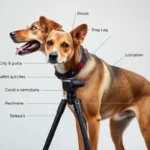
Owning a dog can bring immense joy, companionship, and love into your life. However, it’s also a significant responsibility that requires careful consideration. One of the most critical aspects of dog ownership is understanding the financial commitment involved. So, how much does it cost to adopt a dog? In this guide, we’ll explore the various costs associated with dog adoption, including initial fees, ongoing expenses, and additional considerations.
Understanding Adoption Fees
Overview of Adoption Fees
Adoption fees are the costs associated with bringing a dog into your home through a shelter, rescue group, or breeder. These fees typically cover essential services like vaccinations, spaying/neutering, and, in some cases, initial medical care. The fees can vary significantly based on the source of adoption, and understanding these differences is crucial for prospective dog owners.
Average Costs by Type of Organization
When considering how much it costs to adopt a dog, it’s essential to look at the type of organization you choose:
-
Shelters: Adoption fees at shelters usually range from $50 to $250. This fee often includes vaccinations, spaying/neutering, and sometimes even a starter pack of supplies.
-
Rescue Groups: These organizations may charge between $100 and $300. While their fees can be higher due to fewer resources, they often include comprehensive vet checks and thorough behavioral assessments.
-
Breeders: If you choose to adopt from a breeder, expect to pay anywhere from $500 to $3,000. The higher costs reflect pedigree, specialized breeding practices, and health checks that ensure the dog is free from genetic issues.
Possible Discounts and Grants
Many shelters and rescue organizations offer low-cost adoption events, especially during weekends or special occasions. Additionally, some institutions provide grants for low-income families or veterans. Researching local options can help lessen the initial financial burden associated with adopting a dog.
Initial Expenses After Adoption
Once you’ve adopted your furry friend, there are several initial expenses to consider.
Basic Supplies
Before bringing your dog home, you’ll need to stock up on essential supplies:
-
Food and Water Bowls: Expect to spend around $10 to $30 for a good-quality set. Stainless steel bowls are often recommended for their durability and ease of cleaning.
-
Dog Food: Depending on the size and dietary needs of your dog, monthly food costs typically range from $30 to $150. Consider investing in quality food that provides balanced nutrition.
-
Leash and Collar: A sturdy leash and collar can cost between $20 and $60. Quality is crucial for your dog’s safety, so choose products that are well-made.
Medical Expenses
Initial medical expenses are crucial for your dog’s health:
-
Initial Veterinary Check-up: A first visit to the vet can cost between $50 and $150. This check-up is vital for establishing a health history and addressing any immediate concerns.
-
Vaccinations: Core vaccines can range from $75 to $100, including rabies, distemper, parvovirus, and adenovirus, with additional costs for boosters.
-
Spaying/Neutering: If this procedure isn’t included in your adoption fee, it can add another $200 to $500, depending on your dog’s size and the clinic’s prices.
Training and Socialization
Training is an essential part of dog ownership:
-
Basic Obedience Classes: Group classes typically cost between $100 to $300 for a 6-8 week program. These classes help instill good behavior and strengthen the bond between you and your dog.
-
Socialization Opportunities: Investing in socialization through group classes or playdates is invaluable, as it helps your dog develop healthy interactions with other dogs and people.
Ongoing Costs of Dog Ownership
Beyond initial expenses, there are ongoing costs that every dog owner should anticipate.
Food Expenses
Dog food is a recurring expense that varies based on several factors, including your dog’s size, breed, and dietary needs. Monthly food costs can range from $30 to $150, depending on the quality and brand of food you choose. Larger dogs generally require more food, leading to higher expenses.
Regular Veterinary Care
Routine veterinary care is crucial for maintaining your dog’s health:
-
Routine Check-ups: Most vets recommend annual check-ups, typically costing between $100 and $300. These appointments help monitor health and catch potential issues early.
-
Preventive Medications: Flea, tick, and heartworm prevention can add another $25 to $100 per month, depending on the medications you choose.
Grooming Needs
Grooming needs can vary widely based on your dog’s breed:
-
Frequency and Costs of Grooming: If you have a long-haired breed, professional grooming can cost between $30 and $90 every month. Short-haired breeds may require less grooming, leading to lower costs.
-
DIY Grooming vs. Professional Services: While professional grooming is often recommended, basic grooming tools like brushes, shampoos, and nail clippers can be purchased for under $100, allowing for some self-grooming.
Pet Insurance
Pet insurance is an option worth considering:
- Overview of Pet Insurance: This coverage can help manage unexpected medical costs. Policies vary, with premiums ranging from $20 to $100 per month, depending on your dog’s age, breed, and coverage level.
Additional Costs to Consider
It’s essential to factor in additional costs that may arise.
Emergency Medical Expenses
Unexpected medical emergencies can be costly, often ranging from $500 to several thousand dollars. Having a financial buffer specifically for pet care can ease the burden of sudden expenses.
Boarding and Pet Sitting
If you travel frequently, consider the costs associated with boarding or pet-sitting services:
-
Costs Associated with Boarding Facilities: Boarding can range from $25 to $75 per night, depending on the facility and services offered.
-
Alternatives like Pet-Sitting Services: Hiring a pet sitter may cost between $15 and $50 per visit, offering a more personalized care experience for your dog.
Dog Licensing and Registration
Most places require dog licensing, which can range from $10 to $50 annually. Keeping your dog registered is crucial for identification and compliance with local laws.
Budgeting for Dog Ownership
Creating a budget can help manage the financial aspects of dog ownership.
Creating a Monthly Budget
To effectively manage costs, break down your ongoing expenses into a monthly budget. Typical expenses may include:
- Food: $30 – $150
- Veterinary Care: $100 – $300 (annual visit)
- Medications: $25 – $100
- Grooming: $30 – $90
- Insurance: $20 – $100
- Miscellaneous: $20 – $50 (toys, treats, etc.)
Financial Preparation for New Dog Owners
Before adopting, it’s wise to save a dedicated amount specifically for pet care. Establishing an emergency fund can also provide peace of mind, ensuring you’re prepared for any unexpected costs.
Conclusion
Understanding how much it costs to adopt a dog is vital for anyone considering bringing a furry friend into their lives. From initial adoption fees to ongoing expenses, thoughtful financial planning can help ensure a smooth transition into dog ownership. By preparing for the responsibilities that come with having a dog, you can fully enjoy the companionship and unconditional love they provide.
Frequently Asked Questions (FAQ)
What are the hidden costs of dog ownership?
Hidden costs can include unexpected medical expenses, additional supplies, and training needs that may arise over time.
Can I adopt a dog on a tight budget?
Yes, many shelters offer low-cost adoptions and resources for low-income families, making it possible to adopt a dog within a budget.
How can I save money on dog care?
Consider DIY grooming, shopping for sales on dog food, and exploring pet insurance options that fit your budget.
What should I consider before adopting a dog?
Consider your lifestyle, the time and resources you have for training and care, and your long-term financial commitment to dog ownership.
By understanding the financial implications of adopting a dog, you can make an informed decision that benefits both you and your future furry companion.









